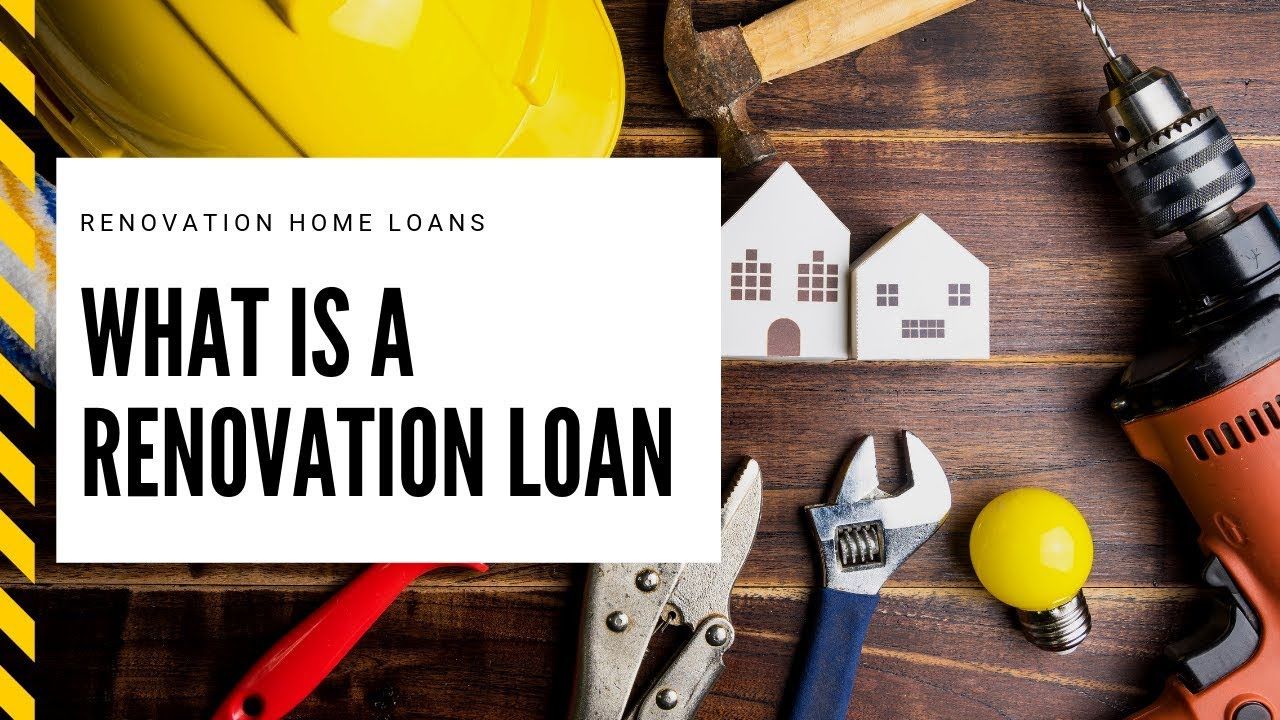Renovation Loan on Inherited Property simplifies the process of upgrading inherited homes. It provides funds for addressing property issues, increasing value, and personalizing the space. This financial tool streamlines renovation efforts, ensuring inherited properties are transformed into desirable and functional spaces.
The Renovation Loans
Renovation loans are specialized financial products designed to provide funding for home renovations. Unlike traditional mortgages, which are based on the property’s current value, renovation loans consider the property’s potential value after renovations. This allows borrowers to finance both the purchase price and the cost of renovations in a single loan.
There are several types of renovation loans available, including FHA 203(k) loans, Fannie Mae Home Style loans, and VA renovation loans. Each has its eligibility criteria, loan limits, and terms, so it’s essential to research your options carefully to find the best fit for your needs.
Test Of With Inherited Properties
Inherited properties often present their own challenges. From outdated features to deferred maintenance, these properties may require extensive renovations to make them suitable for modern living. Additionally, navigating the legal and financial aspects of inheritance can be complex and time-consuming.
One of the most significant challenges with inherited properties is financing the necessary renovations. While some borrowers may have the funds available to cover renovation costs out of pocket, many others rely on financing options such as renovation loans to make the necessary improvements.
Benefits of Renovation Loans on Inherited Properties
Renovation loans offer several benefits for individuals inheriting properties. First and foremost, they provide the funding needed to address any issues with the property’s condition. Whether it’s updating the kitchen, renovating the bathrooms, or repairing structural damage, renovation loans ensure that the property can be brought up to modern standards.
Additionally, renovating an inherited property can significantly increase its value. By investing in renovations that improve the property’s functionality, aesthetics, and energy efficiency, borrowers can maximize their return on investment when it comes time to sell or rent the property.
Furthermore, renovation loans allow borrowers to customize the property to their personal preferences. Whether they’re planning to live in the home themselves or rent it out to tenants, renovation loans provide the flexibility to make renovations that suit their needs and lifestyle.
How to Qualify for a Renovation Loan on an Inherited Property
Qualifying for a renovation loan on an inherited property is similar to qualifying for any other type of mortgage. Borrowers will need to meet certain eligibility criteria, including a minimum credit score, stable income, and a debt-to-income ratio within acceptable limits.
In addition to meeting these criteria, borrowers will need to provide documentation to support their loan application. This may include proof of income, tax returns, bank statements, and a detailed renovation plan outlining the scope of work and estimated costs.
Choosing the Right Renovation Loan
Choosing the right renovation loan is crucial to the success of your renovation project. Take the time to research your options and compare loan terms, interest rates, and fees from multiple lenders. Additionally, consider seeking guidance from a financial advisor or mortgage broker who can help you navigate the complexities of renovation financing.
The Renovation Process
Once you’ve secured financing, it’s time to begin the renovation process. Start by creating a detailed renovation plan that outlines the scope of work, timeline, and budget for the project. Then, hire reputable contractors and oversee the renovation work to ensure that it meets your standards and stays within budget.
Avoiding Common Pitfalls
While renovating an inherited property can be rewarding, it’s essential to avoid common pitfalls that can derail your project. Be cautious of over-renovating, as spending too much on upgrades that won’t add value to the property can eat into your budget and diminish your return on investment. Additionally, be diligent about managing your budget and expenses to avoid financial strain during the renovation process.
Success Stories
To inspire and motivate borrowers, share success stories of individuals who have successfully renovated inherited properties using renovation loans. Highlight the transformations these properties underwent and the positive impact they had on their value and livability.
The Potential Renovating an Inherited Property

Inheriting a property can be a mixed blessing. While it comes with sentimental value and memories, it often requires significant renovation to bring it up to modern standards. Renovating an inherited property not only revitalizes its charm but also increases its market value. Here’s how you can leverage a renovation loan to transform your inherited property into a lucrative asset.
Renovation Loans: Your Key to Transformation
Renovation loans are financial instruments designed to provide funds specifically for renovating or repairing a property. Unlike traditional mortgages, renovation loans consider the property’s after-renovation value, ensuring you have sufficient funds to cover the costs of upgrades and improvements. These loans offer flexibility in terms of repayment options, interest rates, and eligibility criteria.
Assessing the Property: Identifying Renovation Needs
Before diving into renovations:
- Conduct a thorough assessment of the inherited property.
- Identify areas that require immediate attention, such as structural repairs, outdated systems, or cosmetic enhancements.
- Prioritize renovations based on their impact on the property’s functionality, safety, and aesthetic appeal.
This proactive approach allows you to allocate renovation funds effectively and maximize the property’s potential.
Crafting a Renovation Plan: Setting Clear Goals
A well-defined renovation plan serves as a roadmap for transforming your inherited property. Outline your objectives, budget constraints, and timeline for completion. Consider consulting with real estate professionals or interior designers to gain insights into market trends and buyer preferences. By aligning your renovation plan with market demands, you increase the property’s appeal and resale value.
Securing Financing: Leveraging Renovation Loans
Once you have a comprehensive renovation plan in place, it’s time to secure financing. Renovation loans offer a streamlined application process, allowing you to access funds quickly and efficiently.
Compare loan options from various lenders to find the most competitive rates and terms. Factor in additional costs such as closing fees, appraisal expenses, and contingency reserves to avoid financial setbacks during the renovation process.
Bring About Renovations: Bringing Your Vision to Life
With financing in place, commence renovations according to your predetermined plan. Hire licensed contractors and tradespeople to ensure quality artistry and compliance with building codes.
Monitor the renovation progress regularly to address any unforeseen challenges or deviations from the original plan. Effective communication with contractors and timely decision-making is crucial for keeping the project on track and within budget.
Adding Value: Enhancing Property Features
As you proceed with renovations, focus on enhancing the property’s features to attract potential buyers or tenants. Invest in high-impact upgrades such as kitchen remodels, bathroom renovations, and energy-efficient installations.
Pay attention to curb appeal by landscaping the exterior and updating entryways. By enhancing the property’s functionality and aesthetics, you create a desirable living space that commands a higher market value.
Marketing Your Renovated Property: Highlighting its Potential
Once renovations are complete, showcase the transformed property through effective marketing strategies. Leverage professional photography, virtual tours, and staging techniques to highlight its best features.
The value-added upgrades and improvements that set the property apart from comparable listings. Utilize online platforms, social media channels, and real estate networks to reach potential buyers or renters effectively.
How to Take Out a Loan on an Inherited Home
Taking out a loan on an inherited home requires careful consideration and understanding of the process. Firstly, assess the property’s condition and determine the renovation needs.
Next, research loan options suitable for inherited properties, such as renovation loans or home equity loans. Consult with lenders to explore eligibility criteria and documentation requirements. Prepare necessary documents, including proof of ownership and property value estimates.
Once approved, utilize the loan funds wisely to renovate and enhance the inherited home’s value. Lastly, ensure timely repayment to avoid financial complications. Taking out a loan on an inherited home can facilitate renovations and maximize its potential.
Recently Inherited a Home. How a Bridging Loan can Help

Have you recently inherited a home? A Bridging Loan can be your saving grace. This short-term financing option provides quick access to funds, allowing you to manage expenses associated with inheriting a property.
Whether you need to cover probate costs, property taxes, or renovation expenses, a Bridging Loan offers flexibility and peace of mind during this transition period.
By leveraging the equity in the inherited home, you can navigate financial obligations seamlessly while planning for the future. Consider a Bridging Loan to alleviate the burden of unexpected expenses and make the most of your inherited property.
What is the Most Expensive Room to Renovate in a House
The kitchen tends to be the most expensive room to renovate in a house. This is primarily due to the cost of appliances, cabinetry, countertops, and flooring.
Additionally, kitchen renovations often involve plumbing and electrical work, which can further drive up expenses. Homeowners may also opt for high-end finishes and fixtures, adding to the overall cost.
With its central role in daily life and the potential for a significant return on investment, investing in a kitchen renovation can be worthwhile. However, it’s essential to budget carefully and prioritize upgrades to ensure the best possible outcome.
Recent Estate Probate and Trust Loans Funded by North Coast Financial
North Coast Financial has recently funded several estates, probate, and trust loans, providing quick and reliable financing solutions. These loans assist heirs and beneficiaries in need of immediate funds to settle estate matters.
With North Coast Financials expertise and efficient process, clients can easily navigate the complexities of estate, probate, and trust situations.
Probate & Trust Loans Resource Guide
Probate & Trust Loans Resource Guide offers invaluable assistance to those navigating the complex terrain of probate and trust matters. With concise yet comprehensive information, this guide equips individuals with the knowledge needed to understand the probate process, access trust loans, and manage estate affairs efficiently.
From explaining legal procedures to outlining loan options, it serves as a trusted companion for heirs, executors, and trustees alike.
Whether seeking guidance on probate timelines or exploring trust loan eligibility, this resource guide is an essential tool for anyone involved in estate settlement. With its clear insights, it simplifies the often daunting task of probate and trust management.
Conclusion
Renovating an inherited property can be daunting, but with the right financing and planning, it’s entirely achievable. Renovation loans provide the funding needed to address issues with the property’s condition, increase its value, and customize it to your preferences. By understanding the renovation process, choosing the right loan, and avoiding common pitfalls, you can turn your inherited property into the home of your dreams.
FAQ
What is a Renovation Loan?
A Renovation Loan provides homeowners with the financial means to undertake essential or desired home improvements, granting access to credit for these enhancements. These loans encompass various options, ranging from straightforward personal loans to government-backed alternatives.
What Type of Expense is Renovation?
Shawn, it’s important to differentiate between repairs and renovations for rental properties. Repairs are considered current expenses and can be deducted in the year they occur. On the other hand, renovations are capital expenses, which can’t be deducted immediately but can lower your capital gain when selling.
What Type of Account is Renovation?
In the balance sheet, the cost of renovation is typically classified as a property and equipment asset and capitalized as part of the cost of the fixed asset. This means that the cost is recorded as an asset on the balance sheet and depreciated over time.
Does Renovation Include Furniture?
There are several different types of renovation, usually categorized as either ‘cosmetic’ or ‘structural. ‘ Cosmetic renovation refers to updating the existing features of a home through work like painting, minor repairs, replacing furniture and flooring, and updating fixtures or fittings.
What is the Most Expensive Part of a Renovation?
The kitchen, bathroom, and basement, along with other entertainment areas, typically rank as the most expensive part of a remodel. Remodeling a home can be an exciting journey, transforming your living space into a more functional and aesthetically pleasing environment.



